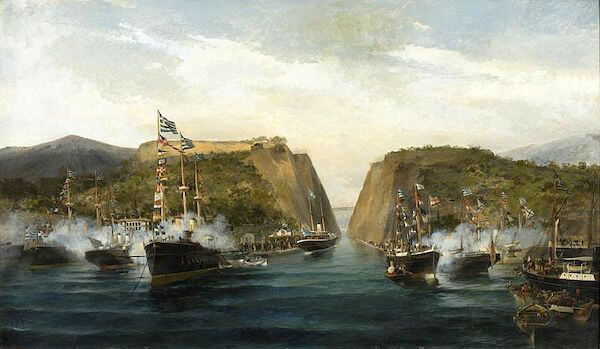Or: Taking Their Time to (Not) Get it Right

My good friend Jeff Mann, the true Yard Ramp Guy, has asked me to revisit some of my original posts. This week in my From the Archives series: what became of the longest construction project in history?

That's Some Celebration
The longest construction project in history lasted almost two thousand years.
The Corinth Canal is a four-mile-long, seventy-foot-wide canal that separates the Peloponnese peninsula from mainland Greece, technically making it an island.
The Corinthian Tyrant Periander first proposed the canal in the seventh century BCE. It swiftly became too expensive, and Periander instead constructed a Diolkos, a stone road designed to use to drag (or portage) ships across the narrow isthmus. (You can still see remnants of the Diolkos alongside the canal.)
The canal idea was next resurrected in the third century BCE by Diadoch Demetrius Poliorcetes, one of the generals who warred over the remnants of Alexander the Great's empire after his death. His surveyors, however, miscalculated and feared that the canal would result in large-scale flooding, so the project was abandoned.

Me: Taking My Time, Too
Roman Emperors Julius Caesar and Caligula both considered constructing the canal, but both were assassinated before they could begin. Emperor Nero became the first ruler to actually move forward with the construction of the canal—and, in fact, was the first person to labor on it, digging up the first basket of soil with a pickaxe. Construction officially began in 67 AD, after centuries of false starts.
Almost immediately afterward, of course, Nero got assassinated.
For nearly two thousand years after that, the idea never progressed farther than another proposal. Several conquerors of Greece throughout its history considered the idea, but nothing happened.
Then, in the 1830s, Greece gained its independence from the Ottoman Empire. New proposals immediately started back up, and construction finally started in the 1880s. (That’s a pretty short amount of time, as far as the Corinth Canal goes.)
Finally, on July 25, 1893, Greece completed the Corinth Canal. And, of course, it was too narrow, too windy, and had currents that were too severe for it to be of much use, except to a small number of ships a year.
Yard Ramp Guy Blog: Peripheral Vision
This week, my friend The Yard Ramp Guy has compelling insight on the benefits of financing.
Click HERE to help your bottom line.
